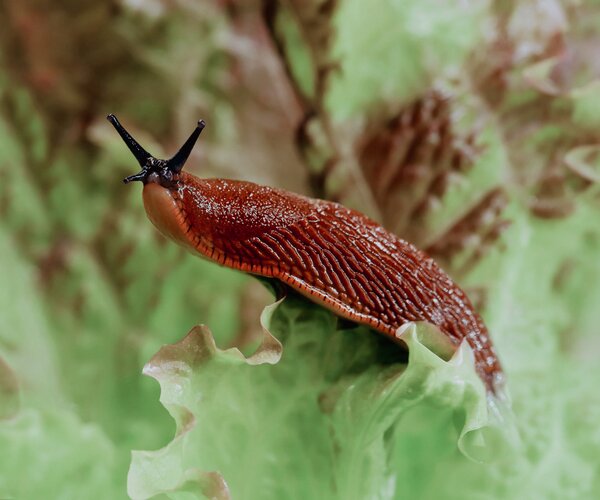
Multi-knowledge: Watch out for the slime trail - slug-free gardening made easy
A splendid garden full of flowering plants and crunchy vegetables is the dream of every hobby gardener. But this dream can quickly turn into a nightmare when slugs and snails feast on the plants that have been painstakingly tended and cared for. Discover practical and sustainable tips in this article that will keep your green oasis slug-free - without any chemicals.

Many paths lead to a slug-free garden
When we talk about ‘slugs’, in most cases we are referring to Spanish slugs. These slimy pests are known for eating entire beds bare overnight. But before you resort to chemicals, there are a variety of natural and environmentally friendly methods to keep slugs and snails out of your garden.
When we talk about ‘slugs’, in most cases we are referring to Spanish slugs. These slimy pests are known for eating entire beds bare overnight. But before you resort to chemicals, there are a variety of natural and environmentally friendly methods to keep slugs and snails out of your garden.
Snails are picky too
There are plants that slugs don't seem to be interested in at all. Create areas in your garden where you can be sure that no slugs will crawl across your path and your plants are safe. You can also use these plants to create barriers around your sensitive protégés.
The essential oils contained in roses, geraniums and lavender deter slugs and snails so that they are not tempted to attack the plant in the first place.
The journey is the destination
A well-known and effective method is to lay old wooden boards as paths in the garden. It is always nice and damp underneath: the ideal place for slugs! You can simply turn the boards over and collect the slugs.
A well-known and effective method is to lay old wooden boards as paths in the garden. It is always nice and damp underneath: the ideal place for slugs! You can simply turn the boards over and collect the slugs.
Promote beneficial organisms
There should be a wild corner in every garden where nettles, for example, are allowed to grow and nesting sites for wild bees and other insects are provided. Ground beetles and fireflies eat the nests of slugs and snails, thus contributing to a slug-free garden.
If you have enough space, you can also consider getting a few runner ducks. Nesting boxes for birds also provide a great breeding ground for all kinds of nimble hunters. These friendly, feathered neighbours are keen snail collectors and are extremely efficient at their work.
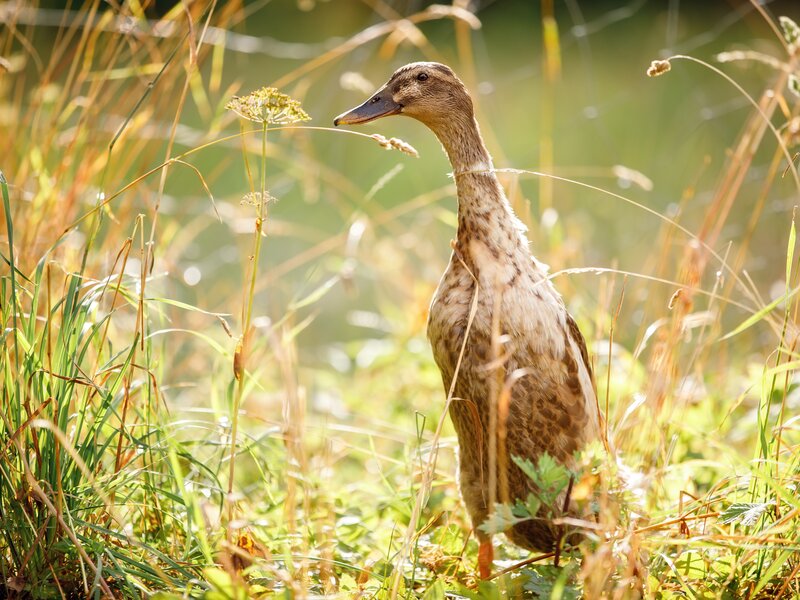
Do you know your beneficial organisms?
Not all slugs are your competitors in the garden. While some can heavily infest your plants, others help to aerate the soil and decompose dead plant material. The tiger slug will even help you fight for your plants! It eats slugs and their eggs.
Tiger snails and slugs eat other snails and their eggs. They also keep your garden clean by decomposing plant debris.
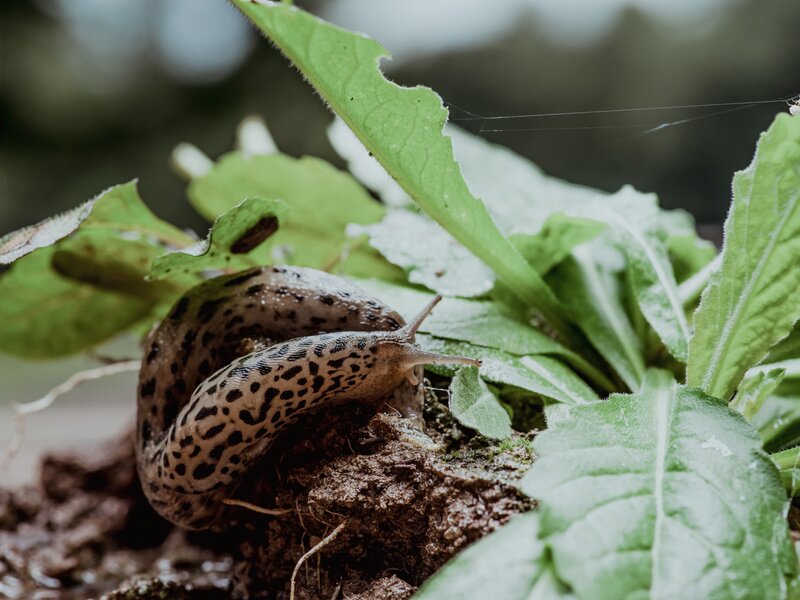
The Spanish slug and other slugs are particularly voracious and will feast on your vegetable plants.
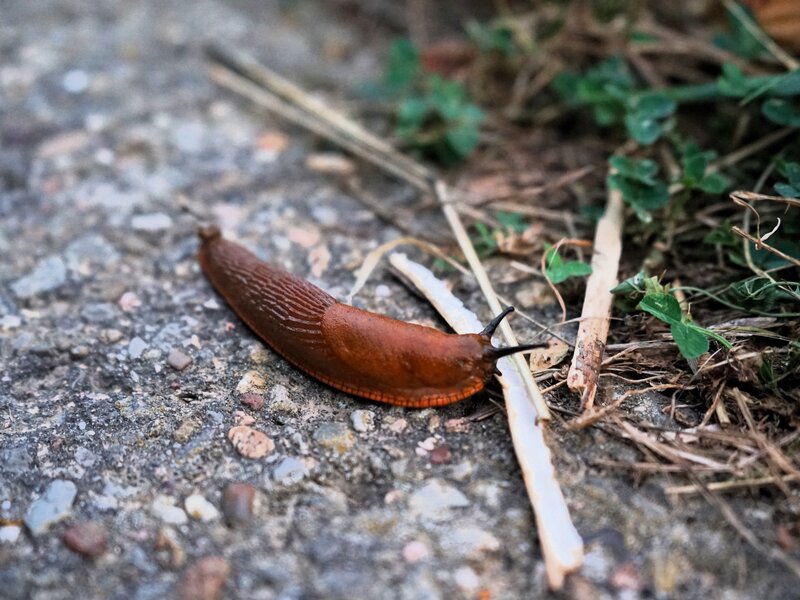
Prevent rotting
Water mulch and plants consistently with Roots. Snails love dead, rotting plant tissue. Roots promotes regenerative processes and suppresses decay. Also make sure that you only add mature compost and manure to your beds. Good Bokashi offers a perfect fertiliser alternative that is reliably avoided by slugs and snails.
Correct watering
Water your garden early in the morning. This allows the water to penetrate the soil to the roots and the soil surface to dry out during the day. If you only water in the evening, you create ideal moisture conditions for snails. It is also important to water the plants only in the root area and not over a large area.
Strengthen young plants
Freshly planted young plants are often under ‘plant shock’, which makes them a welcome treat for the little slime moulds. Water them well with Roots and spray them with Fermented Garlic and Chilli Extract (2 capfuls to 1 litre of water) to boost their defences right from the start.
Water mulch and plants consistently with Roots. Snails love dead, rotting plant tissue. Roots promotes regenerative processes and suppresses decay. Also make sure that you only add mature compost and manure to your beds. Good Bokashi offers a perfect fertiliser alternative that is reliably avoided by slugs and snails.
Correct watering
Water your garden early in the morning. This allows the water to penetrate the soil to the roots and the soil surface to dry out during the day. If you only water in the evening, you create ideal moisture conditions for snails. It is also important to water the plants only in the root area and not over a large area.
Strengthen young plants
Freshly planted young plants are often under ‘plant shock’, which makes them a welcome treat for the little slime moulds. Water them well with Roots and spray them with Fermented Garlic and Chilli Extract (2 capfuls to 1 litre of water) to boost their defences right from the start.
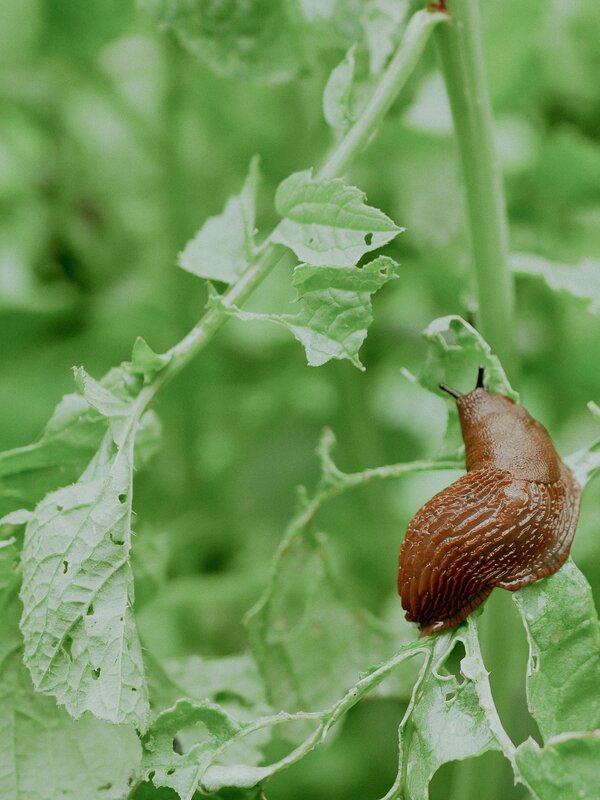
What if the creepers have already made themselves at home?
If you encounter numerous uninvited guests in your garden despite all preventative measures, these immediate measures can help:
Collect and relocate snails
Lay out boards - snails are magically attracted and can be collected and relocated to the nearest forest.
Barriers made of stone dust
Sprinkle rock flour around your plants. The fine powder draws out a lot of moisture from the slugs, so avoid crawling over it. However, the ‘protective wall’ should be renewed after the rain.
Multi-knowledge - Barbara's effective tips for every home
Discover the best advice from our expert Barbara Enengel for a sustainable home and a flourishing garden in our blog series ‘Multiwissen - Barbaras effektive Tipps für jedes Zuhause’. Whether it's about cleaning your living space ecologically or transforming your garden into a blooming oasis, Barbara's tips will enrich your everyday life. Stay tuned for inspiring stories and smart life hacks! Barbara Enengel studied agriculture at the University of Natural Resources and Life Sciences in Vienna. She is interested in natural cycles and ecological relationships in nature and in the garden. She is particularly interested in a diverse and healthy habitat for humans, animals and plants, a principle that she passionately realises in her beautifully landscaped and ecologically managed garden.
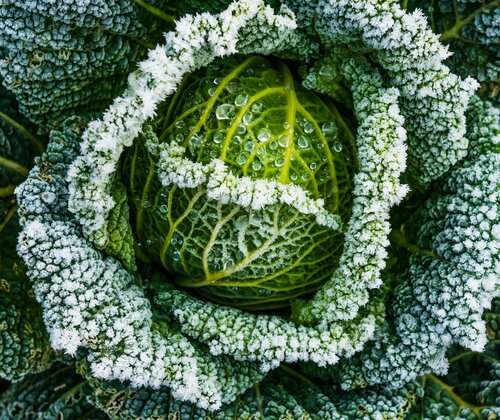
Even if winter seems a long way off in the summer heat, now is the perfect time to set the course for a rich winter harvest. If you want to enjoy fresh vegetables from your own garden all year round, make sure you choose the right varieties and sowing times. With a little planning and commitment, you can harvest a variety of winter vegetables that cannot be found in the supermarket.

A colourful vegetable garden is the pride of every gardener. In this blog post, we show you practical and sustainable strategies for protecting your vegetable plants from pests. From natural defence methods to proven horticultural techniques, we'll show you how to keep your plants strong and resilient.
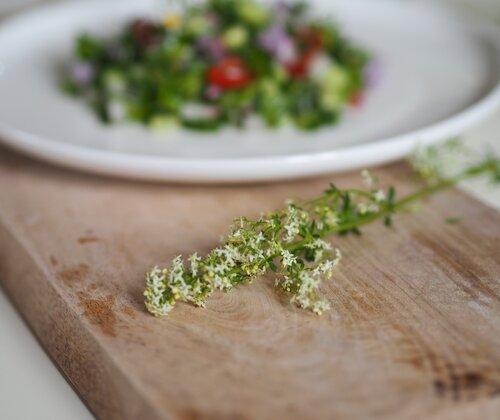
Summertime is harvest time - and not just in the garden. A veritable treasure trove of wild herbs awaits you in meadows, hedgerows and forests, which are available free of charge and in the highest quality right on your doorstep. We will show you how to recognise these herbs and use them creatively in your kitchen.
